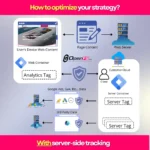The Ultimate Guide to Implementing Trends and Metrics for Digital Marketing Success
Let’s cut through the noise and get straight to the point. Digital marketing isn’t about chasing the latest fad or drowning in jargon—it’s about driving real, measurable results for your business. In this comprehensive guide, we’ll equip you with the tools and knowledge to implement trends that matter and metrics that move the needle. No fluff, just actionable insights to supercharge your digital marketing efforts in New Jersey and beyond.
The Digital Marketing Landscape: Understanding What Really Works
The digital world evolves at breakneck speed, but here’s the truth: not every trend deserves your time or budget. We’re focusing on strategies that actually drive business growth while ignoring vanity metrics that look impressive but don’t impact your bottom line.
Think of digital marketing as a high-performance engine. Trends are the fuel, and metrics are your dashboard. Without both working in harmony, you’re essentially driving blind. This guide will help you navigate this complex landscape with confidence and precision.
Strategic Framework: Your Digital Marketing Blueprint for Success
Success in digital marketing doesn’t happen by accident—it’s carefully engineered through a proven framework that has generated millions in revenue for businesses across industries:
- Planning: Define your goals with laser precision. Who are you targeting? What specific actions do you want them to take? This clarity becomes your North Star for all marketing efforts.
- Execution: Choose your tactics wisely. SEO, PPC, content marketing—each has its strengths. We’ll help you match the right tools to your objectives.
- Measurement: If you can’t measure it, you can’t improve it. We’ll identify the KPIs that truly matter for your business growth and show you how to track them effectively.
- Optimization: Data without action is useless. You’ll learn how to transform insights into optimizations that drive tangible growth and sustainable results.
Planning: Building the Foundation for Digital Marketing Excellence
Effective planning is the bedrock of digital marketing success. While it might not be the most exciting part, it’s absolutely essential for achieving meaningful results. Here’s how to create a solid foundation:
- Define Your Objectives: Be specific and measurable. Rather than saying “increase sales,” aim for “boost e-commerce revenue by 25% in Q3” or “generate 50 qualified leads monthly through content marketing.”
- Know Your Audience: Develop detailed buyer personas that capture not just demographics but psychographics. What keeps your ideal customers up at night? Where do they consume content? This intelligence shapes everything that follows.
- Competitive Analysis: Study your rivals systematically. What are they doing well? Where are the gaps you can exploit? Tools like SEMrush or Ahrefs can provide valuable competitive insights.
- Resource Assessment: Be brutally honest about your capabilities. Do you have the skills, tools, and time in-house, or should you partner with experts like a top digital marketing agency in New Jersey?
Execution: Turning Strategy into Measurable Results
This is where the rubber meets the road. We’re not here to debate theory—we’re focused on driving results. Let’s break down the key elements of effective execution:
Search Engine Optimization (SEO)
SEO isn’t about gaming the system—it’s about creating genuine value for users and search engines alike. Here’s what genuinely moves the needle:
- Technical SEO: Your site must be fast, mobile-friendly, and easily crawlable. No exceptions. Page speed and core web vitals have become critical ranking factors.
- Content Strategy: Create content that answers real user questions and solves genuine problems. Aim to become the definitive resource in your niche.
- Link Building: Earn links through outstanding content and strategic outreach. Remember, quality always trumps quantity in today’s SEO landscape.
For deeper insights, check out our comprehensive guide on proven SEO strategies to boost rankings.
Pay-Per-Click Advertising (PPC)
PPC represents the fast lane of digital marketing. When executed properly, it becomes a powerful revenue-generating machine. Here’s how to maximize your PPC success:
- Keyword Research: Target terms with high intent and conversion potential. Don’t waste your budget on vanity searches that don’t drive business outcomes.
- Ad Copy: Be compelling, specific, and action-oriented. Address pain points directly and offer clear solutions that resonate with your target audience.
- Landing Page Optimization: Your ad is just the beginning. Ensure your landing pages are tightly aligned with ad messaging and optimized to convert visitors into customers.
Ready to supercharge your PPC efforts? Our guide on Conversion Rate Optimization in New Jersey will help you maximize your advertising ROI.
Content Marketing That Delivers Results
Content forms the backbone of effective digital marketing. But not all content delivers equal value:
- Value First: Every piece of content should solve a problem or answer a question for your audience. Value-driven content builds trust and authority.
- Format Diversity: Blog posts, videos, infographics, podcasts—match the format to your audience’s preferences and consumption habits.
- Distribution Strategy: Even brilliant content needs visibility. Develop a comprehensive plan to amplify your message across relevant channels.
Understanding how search engines evaluate content is crucial for success. Dive into our explainer on how search engines work for effective SEO strategies.
Measurement: Focusing on Metrics That Drive Business Growth
Data without context is just noise. Let’s cut through the clutter and focus on the metrics that should actually inform your business decisions:
Website Performance Metrics
- Traffic Quality: Beyond volume, examine source, relevance, and engagement. Where are your most valuable visitors coming from?
- Bounce Rate: Are visitors engaging with your content or leaving immediately? High bounce rates often signal messaging misalignment.
- Page Load Speed: Speed kills in digital—but slow speed kills conversions. A one-second delay can reduce conversions by up to 7%.
Conversion Metrics
- Conversion Rate: The percentage of visitors taking desired actions—whether signing up, downloading, or purchasing.
- Cost Per Acquisition (CPA): How much are you spending to gain each customer? This metric is critical for determining profitability.
- Return on Ad Spend (ROAS): Are your advertising dollars generating profitable returns? Aim for industry-competitive ROAS benchmarks.
For a comprehensive approach to optimizing your digital presence across all channels, explore our guide on Everywhere Optimization vs. Traditional SEO.
Optimization: The Continuous Improvement Cycle
Digital marketing isn’t a “set it and forget it” endeavor—it’s an ongoing process of refinement and improvement:
- A/B Testing: Never assume what works. Systematically test different versions of ads, landing pages, and email campaigns to determine what resonates best.
- User Feedback: Listen attentively to your audience. Their direct insights are gold for improving your marketing effectiveness.
- Competitive Monitoring: Keep tabs on your competitors’ strategies. Adapt and innovate to maintain your competitive edge.
- Technology Updates: The digital landscape constantly evolves. Stay current with new tools, platforms, and algorithms that affect your marketing efforts.
Understanding realistic timelines for results is crucial for proper planning. Check out our article on how long SEO really takes to deliver rankings to set appropriate expectations.
Implementing Trends and Metrics: Your Action Plan
Now that you understand the framework, it’s time to put knowledge into action. Here’s your roadmap to digital marketing success:
- Audit Your Current Efforts: Honestly assess where you stand. Identify strengths to leverage and weaknesses to address.
- Set Clear Goals: Use the SMART framework—Specific, Measurable, Achievable, Relevant, Time-bound—to define your objectives.
- Select Strategic Tactics: Based on your goals and audience, choose the most impactful digital marketing channels and approaches.
- Implement Robust Tracking: Ensure you have the right analytics tools to measure what truly matters for your business.
- Execute Systematically: Launch your campaigns and monitor performance closely, making data-driven adjustments as needed.
- Analyze and Optimize: Regularly review your metrics and refine your approach based on actual performance data.
- Adapt and Evolve: Digital marketing is cyclical. Keep refining your strategy as markets, technologies, and consumer behaviors change.
For local businesses, don’t overlook the power of local search. Our guide on creating an effective Google Business Profile will help boost your local visibility and attract nearby customers.
The Advantage of Professional Digital Marketing Expertise
Digital marketing is increasingly complex, and sometimes bringing in experts is the most cost-effective path to results. At Digital Marketing New Jersey, we specialize in transforming digital strategies into tangible business growth for companies throughout the Garden State.
From New Jersey’s premier SEO services to comprehensive digital marketing campaigns, we’re committed to amplifying your online presence and driving measurable results that impact your bottom line.
FAQs: Essential Questions About Implementing Digital Marketing Trends and Metrics
How long does it typically take to see results from digital marketing efforts?
It varies by channel and objectives. SEO generally requires 3-6 months to show significant results, while PPC can drive immediate traffic. Content marketing often takes 6-9 months to build momentum. The key to success is consistency, quality execution, and ongoing optimization rather than expecting overnight miracles.
What percentage of my business revenue should I allocate to digital marketing?
While there’s no universal answer, most successful businesses invest 7-12% of revenue in marketing, with 60-70% of that going to digital channels. B2C companies typically invest more than B2B. The ideal budget depends on your industry, competition level, growth goals, and current market position.
Which digital marketing metrics correlate most strongly with actual business growth?
The most valuable metrics connect directly to revenue: customer acquisition cost (CAC), customer lifetime value (CLV), return on ad spend (ROAS), and conversion rates. Focus on metrics that demonstrate financial impact rather than vanity metrics like social media followers or raw traffic numbers.
How can I determine which digital marketing trends are worth implementing for my specific business?
Evaluate trends based on their alignment with your business objectives, target audience behavior, and resource capabilities. Run small-scale tests before full implementation. The most valuable trends typically enhance user experience, leverage existing customer data, or improve measurement capabilities rather than simply chasing what’s new.
 Written by: Romulo Vargas Betancourt
Written by: Romulo Vargas Betancourt
CEO – OpenFS LLC







